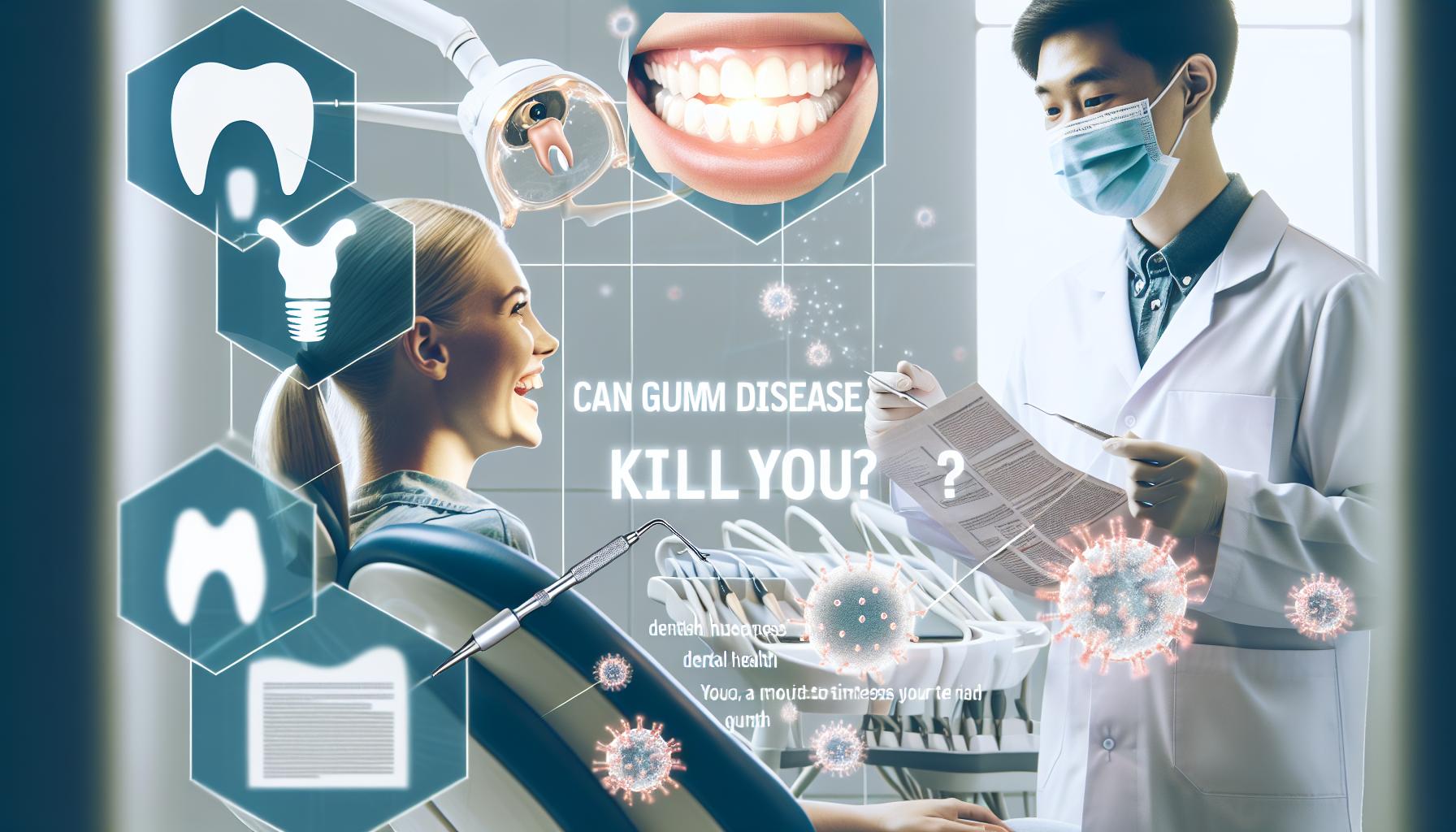
Can gum disease kill you? It sounds like a plot twist in a dental horror movie, but it’s a question more people should be asking. While we often brush off gum disease as just a minor annoyance, the reality is far more sinister. This sneaky villain can do more than just ruin your smile—it could have serious, even deadly implications for your overall health.
I know, it seems dramatic to think your gums could be plotting against you, but there’s science to back it up. Studies have linked gum disease to a host of severe health issues, from heart disease to diabetes. So, if you think skipping your dental check-up is no big deal, you might want to think again. Let’s dive into why keeping your gums healthy isn’t just about fresh breath—it’s about staying alive.
Key Takeaways
- Gum Disease and Serious Health Risks: Gum disease can lead to severe health issues including heart disease, diabetes, and respiratory illnesses, making it more than just an oral health concern.
- Stages of Gum Disease: Understanding the stages—from gingivitis to periodontitis—is crucial for early detection and effective treatment.
- Whole-Body Impact: The inflammation and bacteria linked to gum disease can enter the bloodstream, creating systemic health risks such as cardiovascular issues and higher susceptibility to infections.
- Risk Factors and Symptoms: Smoking, diabetes, poor oral hygiene, and hormonal changes increase the risk of gum disease. Symptoms include swollen, bleeding gums, persistent bad breath, and loose teeth.
- Prevention and Treatment: Daily oral hygiene practices combined with regular professional dental care are vital to prevent and treat gum disease, reducing the risk of severe health complications.
Understanding Gum Disease
Gum disease, a common but serious issue, affects not just oral health but overall health. It can escalate from minor issues to severe problems if untreated.
What Is Gum Disease?
Gum disease starts with plaque buildup. Plaque, a sticky film of bacteria, forms on teeth. It hardens over time into tartar. When not removed, it causes inflammation, progressing to gum disease.
Irritated gums bleed easily. They might swell and become red. This early stage is called gingivitis. Without intervention, it can worsen. The infection can spread, affecting deeper tissues and bone.
Once gum disease advances, it is much harder to treat. The infection can lead to tooth loss. It might even impact your general health. Studies show links between gum disease and other conditions, making timely care crucial.
Types of Gum Disease: Gingivitis vs. Periodontitis
Gingivitis is the earliest form. It presents with red and swollen gums that bleed during brushing. This stage is usually painless but needs attention. Regular dental cleanings and good oral hygiene can reverse it.
Periodontitis follows untreated gingivitis. Here, the inflammation spreads deeper. Gums pull away from teeth, forming pockets that get infected. Plaque spreads beneath the gum line, damaging bone and connective tissue.
This advanced stage may cause tooth loss. It can also affect systemic health. There’s evidence connecting periodontitis with heart disease, diabetes, and respiratory illnesses. Understanding the difference helps in early detection and treatment.
Having clear knowledge of these stages enables proper management. Regular check-ups and good oral hygiene can prevent these conditions. Taking action early makes a significant difference.
The Connection Between Gum Disease and Overall Health
Gum disease doesn’t only affect your mouth. The health of your gums can influence the entire body, potentially leading to serious health issues.
How Gum Disease Affects the Body
Inflammation caused by gum disease releases harmful bacteria into the bloodstream. These bacteria can travel to different parts of the body. Once in the bloodstream, they trigger inflammatory responses elsewhere. For instance, arteries can become inflamed, leading to cardiovascular problems. Studies have shown that people with gum disease are more likely to suffer from heart disease. This systemic impact underscores the importance of maintaining good oral health. Additionally, unmanaged gum disease can weaken the body’s immune response. Ensuring regular dental check-ups and proper oral hygiene prevents the progression of gum disease and its adverse effects on overall health.
Links to Serious Health Conditions
Gum disease has been linked to various serious health conditions. Cardiovascular disease is a prominent example. Bacteria from infected gums can enter the bloodstream and contribute to arterial plaque formation. This can lead to heart attacks and strokes. Diabetes is another condition closely associated with gum disease. People with diabetes are more susceptible to infections, and gum disease can make diabetes harder to control. Respiratory illnesses are also connected. Bacteria from the mouth can be inhaled into the lungs, causing or worsening conditions like pneumonia. Understanding these links highlights the critical role of oral health in preventing severe systemic diseases. Frequent dental visits and proper oral care routines are essential in minimizing these risks.
Risk Factors and Symptoms
Understanding both risk factors and symptoms of gum disease can help in early detection and prevention. If left untreated, gum disease may lead to more severe health issues.
Common Risk Factors
Several factors increase the likelihood of developing gum disease. Poor oral hygiene stands out as a primary cause, often leading to plaque buildup. Smoking significantly raises the risk. It weakens the immune system making it harder to fight gum infections. Certain medical conditions, such as diabetes, also play a role in increasing vulnerability. Some medications can reduce saliva flow which naturally protects gums. Hormonal changes, particularly in women, might make gums more sensitive and susceptible to disease. Family history is an important factor since genetic predispositions can impact gum health. Age can’t be ignored as well since the risk increases over time.
Warning Signs and Symptoms
Recognizing early symptoms helps in prompt treatment. Red, swollen gums often signal the onset of gum disease. Bleeding gums during brushing or flossing shouldn’t be ignored. Persistent bad breath or a bad taste in the mouth points to potential issues. Gum recession, where gums pull away from teeth, is another warning sign. Loose or shifting teeth indicate possible advanced-stage gum disease. Pus between gums and teeth signals infection. Pain while chewing or increased tooth sensitivity may also arise. These symptoms, even if mild, warrant a dental consultation.
Understanding these risk factors and symptoms can make a significant difference in maintaining oral health.
Potential Outcomes of Untreated Gum Disease
Progression to Advanced Periodontitis
Untreated gum disease can progress to advanced periodontitis. This severe stage involves deeper infection and destruction of gum tissue and bone. Periodontitis can lead to tooth loss, causing significant oral health issues. The gums pull away from the teeth, forming deep pockets that fill with bacteria and pus. Over time, these bacteria can erode the bone supporting the teeth, leading to tooth mobility and eventual loss. If left unchecked, this advanced stage of gum disease creates persistent inflammation, affecting overall health.
Impact on Heart Health
Periodontitis can significantly impact heart health. Bacteria enter the bloodstream through inflamed gum tissue, contributing to plaque buildup in arteries. This increases the risk of atherosclerosis, a condition where arteries harden and narrow, blocking blood flow to the heart. Studies link severe gum disease with an elevated risk of coronary artery disease. Inflammation from periodontitis can exacerbate existing heart conditions, making management more challenging. Regular dental care plays a crucial role in mitigating these risks.
Increased Risk of Stroke
Gum disease also increases the risk of stroke. The bacteria and inflammation associated with periodontitis can contribute to blood clot formation, a leading cause of stroke. Research indicates a strong correlation between gum disease and cerebrovascular disease. These harmful bacteria and the body’s inflammatory response can affect blood vessels in the brain. Maintaining excellent oral hygiene can significantly reduce the likelihood of experiencing a stroke related to gum disease.
Prevention and Treatment Options
Preventing and treating gum disease involves a combination of daily habits and professional care. Here’s what you need to know to keep your gums healthy and prevent serious complications.
Daily Oral Hygiene Practices
Brushing teeth twice daily with fluoride toothpaste is crucial. Flossing daily removes food particles and plaque between teeth that a toothbrush can’t reach. Using an antiseptic mouthwash helps reduce bacteria and freshen breath. Drinking plenty of water helps wash away food particles and keep the mouth hydrated. Eating a balanced diet rich in vitamins and minerals supports overall gum health. Avoiding tobacco products significantly reduces the risk of gum disease and other oral health issues. Regularly checking your gums for any signs of disease, such as swelling or bleeding, allows for early intervention.
Professional Dental Care
Regular dental check-ups, at least twice a year, are essential. Dental professionals can remove tartar build-up that brushing and flossing can’t address. Professional cleanings help prevent the progression of gum disease and identify early signs before they become serious. Dentists may recommend deep cleaning procedures, such as scaling and root planing, for those already showing signs of gum disease. Continued education and training for dental professionals ensure the safe use of radiographic equipment and effective treatment plans. Emergency preparedness in dental practices, including trained staff and proper kits, provides safety during unforeseen complications. Addressing dental anxiety through patient-centered care and anxiety-reducing technologies improves the overall experience and adherence to treatment plans.
Investing in both daily and professional dental care can significantly reduce the risk of severe gum disease and its associated health complications.
Conclusion
Recognizing the signs of gum disease early and taking preventive measures can make a significant difference in your overall health. By maintaining good oral hygiene and scheduling regular dental check-ups, you can reduce the risk of severe complications. It’s crucial to understand that gum disease is more than just an oral health issue—it can impact your entire body. Don’t underestimate the importance of daily care and professional treatments in safeguarding your well-being.
Frequently Asked Questions
What are the early signs of gum disease?
Early signs of gum disease include red, swollen, or bleeding gums, particularly after brushing or flossing. Other symptoms may include persistent bad breath, gum tenderness, and receding gums.
How does gum disease affect overall health?
Gum disease can lead to severe health issues, including an increased risk of heart disease, stroke, and diabetes. Untreated gum disease can also result in tooth loss and other systemic health complications.
What are the main causes of gum disease?
Gum disease is primarily caused by plaque buildup due to poor oral hygiene. Other contributing factors include smoking, hormonal changes, certain medications, and underlying health conditions like diabetes.
Can gum disease be prevented?
Yes, gum disease can be prevented through good oral hygiene practices, such as brushing twice a day, flossing daily, using mouthwash, and maintaining a balanced diet. Regular dental check-ups and professional cleanings are also essential.
What are the treatment options for gum disease?
Treatment options for gum disease include professional dental cleanings, deep cleaning procedures like scaling and root planing, and in some cases, antibiotic treatments or surgery. Early-stage gum disease can often be managed with improved oral hygiene.
How often should I go for a dental check-up?
It is generally recommended to visit your dentist for a check-up every six months. However, the frequency may vary depending on your oral health condition and your dentist’s advice.
Is gum disease reversible?
Gingivitis, the early stage of gum disease, is usually reversible with good oral hygiene and professional treatment. However, advanced periodontitis may require more intensive treatment and is not entirely reversible.
Who is at higher risk for gum disease?
Individuals who smoke, have poor oral hygiene, suffer from chronic illnesses like diabetes, take certain medications, or have a family history of gum disease are at higher risk. Hormonal changes in women can also increase susceptibility.








